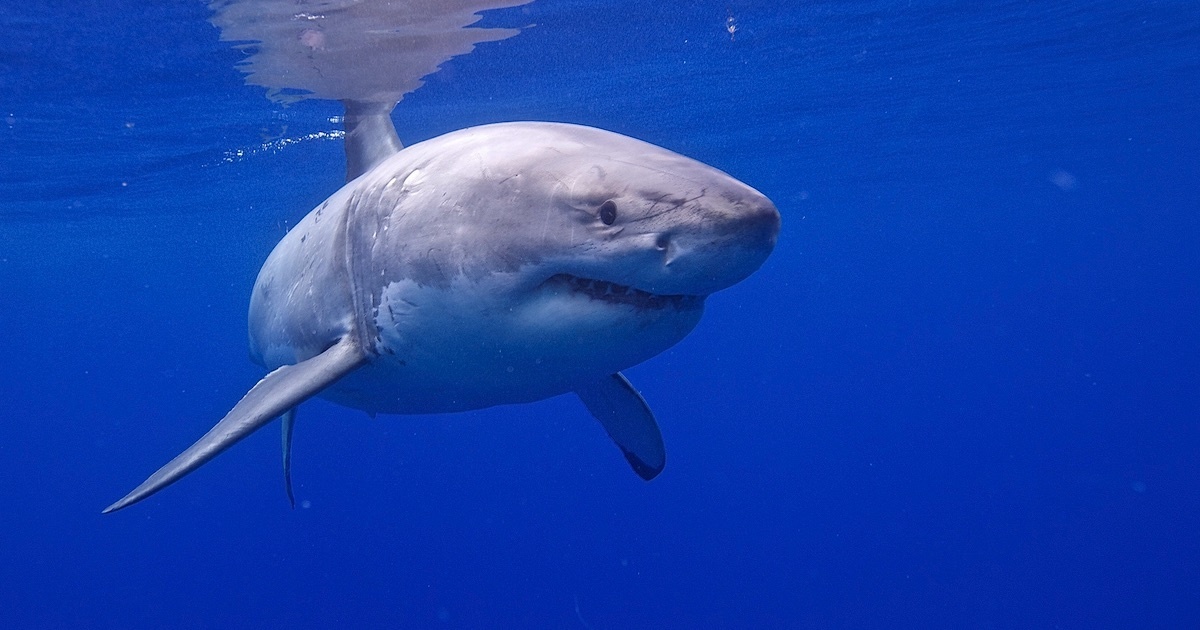

Great white shark. Elias Levy / Flickr / CC BY 2.0
By now you might have seen Ocean Ramsey’s rare and jaw-dropping encounter with a great white shark in waters near Oahu, Hawaii.
Ramsey, a marine biologist, said on the TODAY Show that it was “absolutely breathtaking and heart-melting” to be approached by the massive fish.
The conservationist noted that “moments like this are increasingly rare because shark populations are being wiped out” due to shark finning.
[instagram https://www.instagram.com/p/BsrXYawlieW/ expand=1]
Many commenters praised Ramsey for raising awareness about the vulnerable species and for changing negative perceptions of the powerful predator by showing them in a gentler light.
However, other marine biologists, including Michael Domeier, the founding director of the non-profit Marine Conservation Science Institute, raised concerns about Ramsey’s actions, especially for touching the shark and for possibly inspiring non-experts to hop in the ocean in search of selfies with vulnerable and potentially dangerous ocean creatures.
Baby #Dolphin Dies After Beachgoers Pull It From Water For Selfies https://t.co/Vpu48zztDY @peta @peta2 @MercyForAnimals @WWF @AnimalPlanet
— EcoWatch (@EcoWatch) August 17, 2017
The white, tiger and bull shark are the top three shark species behind the most fatal attacks due to their large size, according to the Florida Museum.
“The number 1 rule of legitimate shark diving operators is DON’T TOUCH THE SHARKS!” Domeier wrote in an Instagram post. “This is not shark advocacy…it is selfish, self-promotion.”
Domeier wrote in a separate Instagram post that a day after Ramsey’s videos went viral, about 60 people visited the waters around her swim, putting themselves and the area’s sharks at risk.
“Guess how many sharks were observed: ZERO! Don’t you think all those people in the water might intimidate the sharks??” he wrote.
David Shiffman, a marine conservation biologist who studies sharks, told The Washington Post: “I can’t believe that ‘please don’t grab the 18-foot long wild predator’ is something that needs to be explicitly said out loud, but here we are.”
“There is absolutely no reason for this person to grab and attempt to ride a free-swimming animal. It doesn’t show that sharks aren’t dangerous, it shows that some humans make bad choices,” Shiffman tweeted.
This photo that you’re all sharing is wildlife harassment from a serial wildlife harasser. There is absolutely no reason for this person to grab and attempt to ride a free-swimming animal. It doesn’t show that sharks aren’t dangerous, it shows that some humans make bad choices. pic.twitter.com/ZpYwPrx2gI
— Dr. David Shiffman (@WhySharksMatter) January 16, 2019
In one Instagram photo, Ramsey’s hand appears to be placed on the shark. She also wrote in a different post, “I waited quietly, patiently, observing as she swam up to the dead sperm whale carcass and then slowly to me passing close enough I gently put my hand out to maintain a small space so her girth could pass.”
Ramsey helps lead educational shark diving tours in Oahu, the Post reported.
“I know some people criticize touch but what some don’t realize is that sometimes sharks seek touch,” Ramsey added in the post. “I wish more people would have a connection with sharks and the natural world, because then they would understand that it’s not petting sharks or pushing them off to maintain a respectable space that is hurting sharks (because trust me if she didn’t like being pet she can handle and communicate).”
She continued, “it’s the wasteful and cruel practice of grabbing and catching sharks to cut off their fins (which slowly kills them) for shark fin soup.”
[Correction: A previous version of this article incorrectly stated that sharks are marine mammals. Sharks belong to a family of fish that have skeletons made of cartilage.]

 233k
233k  41k
41k  Subscribe
Subscribe 